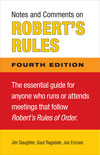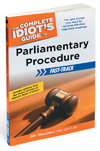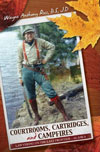 Verdict: Not for Me, Maybe for You
Verdict: Not for Me, Maybe for You
Notes and Comments on Robert’s Rules
By Jim Slaughter, Gaut Ragsdale & Jon Ericson (Carbondale, Ill.: Southern Illinois University Press, 4th ed. 2012). 208 pgs. $19.95. Order, www.siupress.com.
Reviewed by Jacques Condon
In a marketplace deluged with books discussing Robert’s Rules of Order, the authors of the fourth edition of Notes and Comments on Robert’s Rules seek to fill a particular void. Described as “the essential guide for anyone who runs or attends meetings that follow Robert’s Rules of Order,” Notes is not for everyone. The book is neither intimate nor intended as a stand-alone study guide. Instead, Notes encourages members to “obtain and study” Robert’s Rules, using Notes to supplement your study. If viewed solely as a 192-page supplement, Notes works well.
Want to Review a Book?
Have you read a great book that would be of interest to State Bar members? Or one that you want to make sure no one else wastes their time reading? Be a reviewer! Contact us at wislawmag@wisbar.org.
Notes’ best feature is its organization. Part one is a background to Robert’s Rules and its terminology. Part two is a basic tutorial on handling a motion. Part three addresses substantive issues in parliamentary procedure. The final section – the most interesting – discusses Robert’s Rules’ definitions. Robert’s Rules defines everything from what constitutes a quorum to the role of the parliamentarian (depicted as a thankless job); Notes adequately and understandably explains each concept and definition.
Although the book’s organization deserves praise, its substance is distracting. Rather than textbook-style descriptions of Robert’s Rules, Notes is written in question-and-answer format. For instance, in handling motions, Notes asks, “Do all motions require a second?” Notes answers the question (“no”), and then follows with a series of related questions such as, “Must a second be in a certain form?” (also “no”). Although answers are well cited and referenced, the format is difficult to read and becomes the striking feature that defines Notes as a “supplement.”
Overall, Notes is thorough and a helpful aid to understanding Robert’s Rules. But because it is a supplement, it has limited usefulness and cannot be recommended unless your organization strictly adheres to Robert’s Rules.
Jacques C. Condon, Marquette 1999, is a partner at the Nistler Law Office s.c., Brookfield, practicing in business law and commercial litigation.
 Verdict: It’s a Keeper
Verdict: It’s a Keeper
The Complete Idiot’s Guide® to Parliamentary Procedure: Fast-Track
By Jim Slaughter (Indianapolis, Ind.: Alpha Books (Penguin Group), 2012). 160 pgs. $12.95. Order, www.idiotsguides.com.
Reviewed by Jacques Condon
A quote on the cover of The Complete Idiot’s Guide to Parliamentary Procedure: Fast-Track describes the book as a “must read” if you are about to take on a leadership role in any organization. The high praise is warranted for this compact, 150-page, hornbook-style digest.
Perhaps the only negative is the title: “idiot’s” guide connotes watered-down instruction (which the book is not), and “parliamentary procedure” is a confusing reference. Essentially, if you’ve heard of Robert’s Rules of Order, then you’ve heard of one type of procedure for running effective, organized meetings. But rather than focus solely on Robert’s Rules, the Idiot’s Guide is written as a how-to on meetings procedures that might include Robert’s Rules. By focusing on fast-track review, the Idiot’s Guide expertly avoids esoteric, mind-numbing discussion of any particular procedural norm.
The fast-track focus works well. The Idiot’s Guide’s breadth will appeal to all audiences, large and small. The book’s strength is its expansive review, encompassing everything from running a legal and effective meeting, to voting procedure, to minute-taking. Each of the 12 chapters progresses from general instruction to more defined concepts. Concepts are supplemented with helpful parliamentary pointers, including explanations of what is “Out of Order!” As a reference book, the Idiot’s Guide is informative, user-friendly, and easily understandable.
Overall, I highly recommend the Idiot’s Guide as a to-the-point, time-saving guide to conducting shorter, fairer, and more orderly meetings.
Jacques C. Condon, Marquette 1999, is a partner at the Nistler Law Office s.c., Brookfield, practicing in business law and commercial litigation.
 Verdict: It’s a Keeper
Verdict: It’s a Keeper
Courtrooms, Cartridges, and Campfires: Lawyering on the Last Frontier – Alaska
By Wayne Anthony Ross (Anchorage, AK: Publication Consultants, 2010). 224 pgs. $17.95. Order, www.publicationconsultants.com.
Reviewed by Susan K. Allen
Wayne Anthony Ross offers an easy reading story about his life, focusing on his love for the outdoors and his adopted home of Alaska, in Courtrooms, Cartridges, and Campfires: Lawyering on the Last Frontier – Alaska. The book provides an insight into Milwaukee history, describing Ross’s years growing up in the city in the 1950s and 1960s. Many of the references will be familiar to current and former Milwaukeeans alike. In addition, Ross recalls his years as a student at the Marquette University Law School, complete with anecdotes about Professor James Ghiardi’s references to the “reasonable man” and the often-encountered first-day warning to “look to your left; look to your right; one of these people will not be here for graduation.” With this background in place, Ross’s story turns to the main character in his life – Alaska.
In addition to describing small-town law practice over the years, complete with stories about seedy motels, cantankerous judges, and learning the ropes of the law, the author recounts his experience raising a family in Alaska. Paramount in the book, however, is the author’s love for guns and hunting. He provides amusing and exciting stories about the characters and wildlife he encountered and tamed throughout his years in the 49th state. Ross calls on one of the most infamous legal references – Blackacre, the name he has given to his dream home – to end his discussion of the past by outlining his plans for the future, which include relaxing in his favorite place, Alaska. Any lawyer who loves both legal practice and the outdoors will likely be entertained by the experiences Ross describes with ease and nostalgia in this autobiography.
Susan K. Allen, Marquette 2006, is a senior associate in Stafford Rosenbaum’s Milwaukee office and focuses her practice on civil litigation and municipal law matters.
